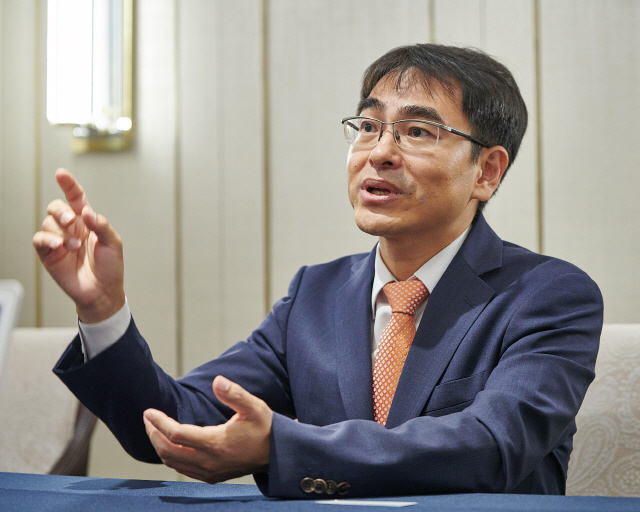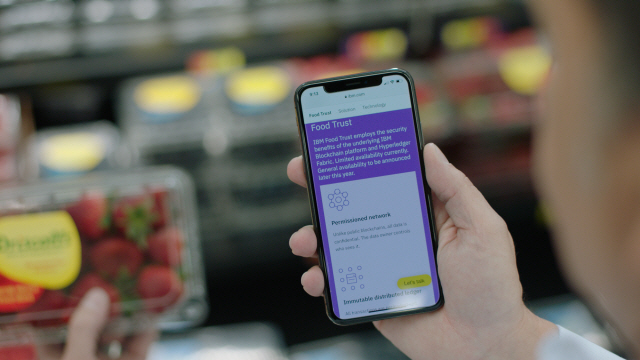
Park Se-youl, director for blockchain technology at IBM Korea, defined the upcoming future as the “age of Blockchain 4.0” and said it would be essential to create a collaboration model among commercialized blockchain networks.
IBM expanding blockchain application cases
IBM is a world-renowned blockchain leading company. Having set foot on blockchain projects in 2014, IBM has accumulated experiences, large and small, of more than 600 projects in various industrial sectors like finance, distribution, medicine and energy. In 2015, 17 organizations belonging to the Linux Foundation including IBM gathered to carry out the open-source “Hyperledger project.” The following year IBM launched “Hyperledger Fabric,” a blockchain platform for enterprises. “IBM is creating substantial blockchain use cases all over the world (by exploiting Hyperledger Fabric),” Park said.
What project has been most impressive to Park among a number of blockchain projects implemented by IBM? He picked “Plastic Bank” among other things. Plastic Bank is a project designed to beef up the recycling ecosystem by exchanging plastic into digital tokens. Today 300 million tons of plastic are produced on the earth every year and 8 million tons of them flow into the sea. “Poor people can buy daily necessities or pay electricity bills in exchange for collecting plastic waste. This is a case in which social enterprises created their own business models by using blockchain rather than relying on donations,” Park said.
‘Influence in global market’ is the biggest weapon
As big global companies such as Facebook and Samsung Electronics have shown their blockchain projects recently, there have been full-blown moves to preoccupy the market. What would IBM’s competitiveness be under these circumstances? Park asserted, “Influence in the global market is IBM’s weapon.”
According to a report released by IPlytics, Germany’s intellectual property analytical company, IBM is a company having the largest number of blockchain family patents across the world. IBM has 185 family patents. A family patent is a patent taken in various countries. Park says companies with larger family patents can have greater influence in the global market. “IBM is truly the global blockchain leader collaborating with hundreds of customers around the world actively,” he said.
IBM is especially strong in distribution. “Food Trust,” a food distribution reference service released by IBM last year, secured transparency in distribution by uploading supply chains onto blockchain. If you use data recorded on blockchain, you could cut the reference time to 2.2 seconds from more than six days at present.
Albertsons Companies, America’s second-largest supermarket chain, joined Food Trust in April. In addition, Nestle, Kroger, Dole and other prominent food companies have been creating a food safety net through the IBM service. “We are building an end-to-end food ecosystem enabling more than 80 brands to use Food Trust to confirm the whole process of distribution. This will make it possible to trace the processes from farms to store display stands in real time,” Park said.

New collaboration model needed for blockchain 4.0
Most recently, Park is taking note of the transition period in the blockchain ecosystem. “The blockchain ecosystem has been going through the age of 3.0 in which the industrial ecosystem is vitalized using technology,” he said. For example, in the age of blockchain 3.0, the distribution history of foods imported from foreign countries was traced (IBM Food Trust) and processes were simplified by digitizing shipping documents by blockchain in the event of cross-border merchandise movement (IBM TradeLens); and lower fees and higher remittance speed were ensured through blockchain-based foreign exchange transactions (IBM Worldwide).
He emphasized that there should be a new collaboration model if blockchain is to make a step forward from the age of 3.0. “Many companies are forming consortia recently to build blockchain networks. This is certainly the time for a new model that could draw collaboration among networks,” Park said. He defined the stage of creating one ecosystem through networks as the “blockchain 4.0.” “The extent of faithful applications of business network design would determine the success or failure of blockchain,” he added. /cho@decenter.kr
- Cho Jae-seok






![[단독] 원화 스테이블코인 '은행·테크 연합군' 먼저 허용](https://newsimg.sedaily.com/2026/01/05/2K76OYC7PZ_6_s.png)
![[단독]원화코인 안정성에 방점…거래소 해킹땐 매출액 10% 과징금](https://newsimg.sedaily.com/2026/01/05/2K76PLTEBG_2_s.jpg)

![비트코인 9만1000달러 안착…투자심리 3달만에 '중립' 전환 [디센터 시황]](https://newsimg.sedaily.com/2026/01/05/2K76N550Z6_1_s.png)

![비트코인 아냐…한국인이 가장 사랑한 '이 코인'은 [코주부]](https://newsimg.sedaily.com/2026/01/02/2K75A56SQI_3_s.jpg)

![비트코인 8만8천달러 박스권…"연말 반등" vs "추가 조정" [디센터 시황]](https://newsimg.sedaily.com/2025/12/22/2H1TU3YMBP_1_s.png)
![비트코인 8만 7000달러대 강세…리밸런싱 수요 주목[디센터 시황]](https://newsimg.sedaily.com/2025/12/17/2H1RJLO6GV_1_s.png)







